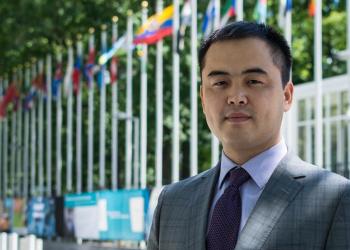Why Rural Communities Matter in the New Urban Agenda
With HABITAT III on the horizon, attention is increasingly turning to cities. “Urban centers have become the dominant habitat for humankind,” wrote the Secretary General in his report.
Yet urbanization is not a process that can continue indefinitely, nor does it advance unaided. Vibrant rural communities are critical to ensuring that migration is a matter of choice and not desperation, thus reducing the kind of unchecked displacement that fuels crime, gang activity, and social fragmentation in urban areas.
The importance of urban-rural linkages is well recognized, of course. But in all too many parts of the world rural communities have been undermined for decades. What structures, then, will be needed to make collective life viable in rural areas – economically, socially, and culturally?
Possible answers are numerous, but two seem particularly important to me: 1.) involving growing numbers in the advancement of society, and 2.) transforming systems for generating and applying knowledge.
Towards universal participation in the betterment of society
Sustainable development often focuses on meeting all needs, on “leaving no one behind,” and rightly so. But just as needs are universal, so is capacity. Development efforts must therefore recognize the potential of every group and people to contribute to the common good, if they are to be truly sustainable.
To assume, even implicitly, that progress flows from urban areas to rural ones is to discount the contributions of literally billions of individuals. The New Urban Agenda therefore needs to reflect principle of universal participation in the advancement of society. Increasing numbers –rural and urban alike - must become the protagonists of progress, and not just the beneficiaries.
In practical terms, this means acknowledging the capacity of rural communities to be vibrant sources of innovation and discovery. How will urban areas benefit from the insights and advances generated in rural ones? How will progress won in the village be communicated to and synthesized by those in the city? Questions such as these will need to be considered time and again in the coming years – not just conceptually, but at the level of budgeting, staffing, project implementation, and resource allocation.
Rethinking the generation and application of knowledge
Achieving the ambitious goals of the New Urban Agenda will require great expansion in the number of those actively generating and applying knowledge about the betterment of society. To truly eradicate poverty or foster sustainable patterns of consumption and production – to take just two of the Agenda’s “transformative commitments” – thousands of communities will need to be actively experimenting and working to identify the prerequisites of progress in their area.
This will require profound transformation in the way we think about learning.
Educational systems, for example, often impose a model whereby the capable rural student leaves her community to pursue schooling in a distant metropolis. Knowledge is understood to be disseminated primarily from urban areas to rural ones, and great masses of humanity are treated largely as passive consumers of understanding developed elsewhere.
Changing such patterns will require, first and foremost, a change in perception – seeing rural areas through the lens of abundance, as opposed to deficiency. It will also require practical, logistical innovations, such as systems for providing schooling and instruction in place, allowing students to immediately begin applying and sharing their learning for the betterment of their communities.
Addressing these challenges will take creativity, collective volition, and a process of learning in its own right. But the potential benefits are numerous. For when viable patterns of community life are nurtured in rural areas, the aims of the New Urban Agenda are advanced in population centers of all types.
-- by Serik Tokbolat, Representative of the Bahá'í International Community to the United Nations
